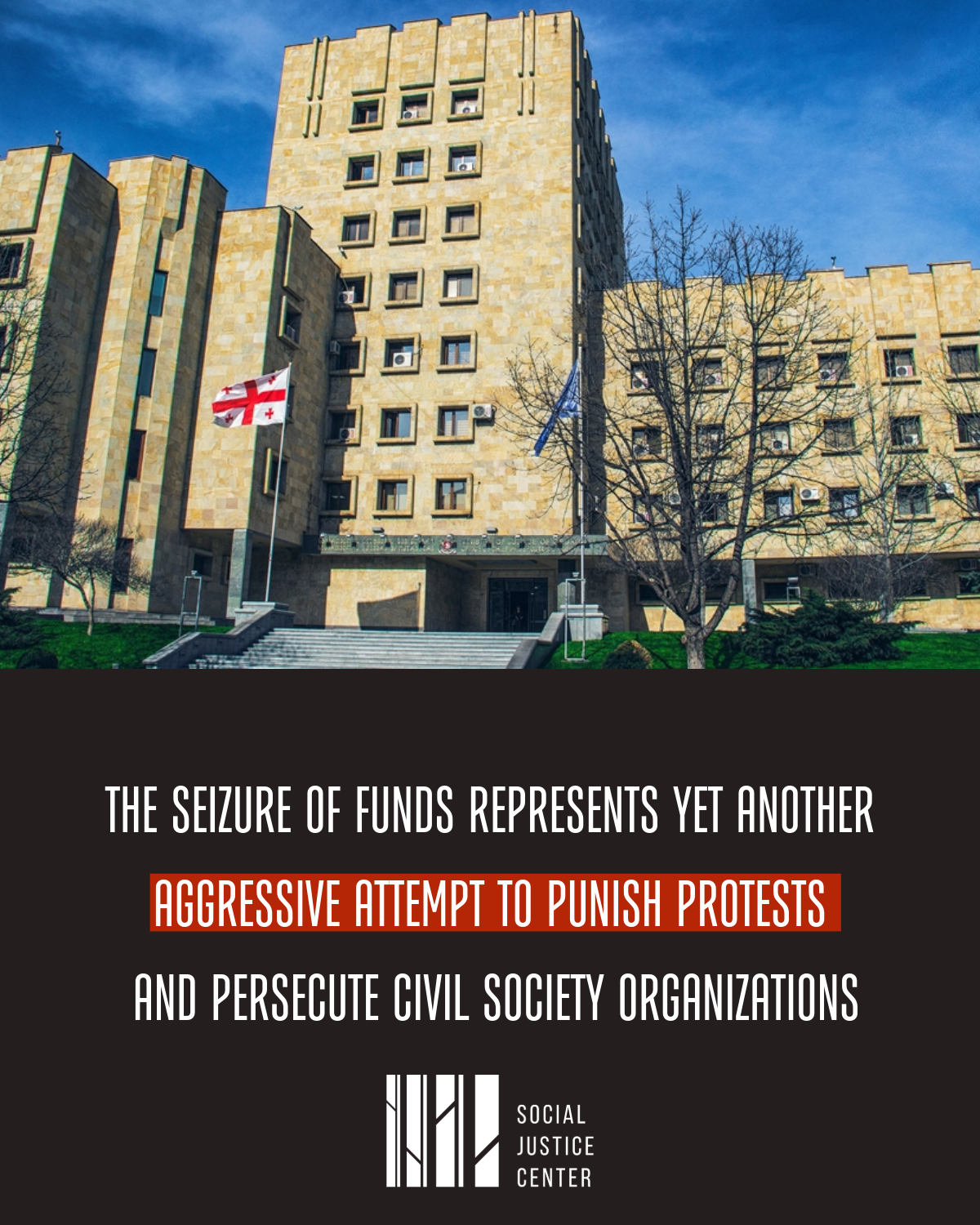საერთო ცხელი ხაზი +995 577 07 05 63


The Social Justice Center responds to the decisions of the Tbilisi City Court, made upon the motion of the Prosecutor’s Office of Georgia, to seize the bank accounts of various foundations and civil society organizations, along with the funds within them. The Center believes this action to be politically motivated, unjustifiably halting the work of specific civil society organizations, and ultimately aiming to diminish the current level of protests in the country while punishing those involved in them.
On March 17, 2025, the Prosecutor’s Office of Georgia released official information stating that, based on its motion, the Tbilisi City Court had seized the bank accounts and funds of the following Non-Governmental Organizations: NNLE “Nanuka’s Foud”, NNLE “Prosperity”, NNLE “Fund for Each Other 24/7”, NNLE “Shame”, and NNLE “Tbilisi Human Rights House”. Each of these organizations learned about the seizure unexpectedly during their operations and has not yet received the court rulings.
According to the Prosecutor’s Office, the basis for the seizure is an ongoing investigation concerning sabotage, attempted sabotage under aggravating circumstances, assistance to a foreign organization or an organization under foreign control in hostile activities, and the mobilization of funds for activities aimed at undermining Georgia’s constitutional order and national security.[1] The Prosecutor’s Office asserts that investigative actions in the criminal case reveal that the aforementioned funds provided material support for various illegal and, in some instances, criminal activities related to the ongoing protest rallies. These organizations are also allegedly directing funds to offer material support to offenders and their families, including covering fines imposed on the offenders. The Prosecutor’s Office has not provided specificities regarding the legal grounds for the seizure, including the provisions of the Criminal Procedural Code under which the funds’ bank accounts were seized.
It is noteworthy that the Prosecutor’s Office of Georgia initiated an investigation into the aforementioned criminal case on February 8, 2025, following an application from the public movement “United Neutral Georgia”, which is represented, among others, by Nana Kakabadze and Vato Shakarishvili.
Issues related to seizure are regulated by Articles 151 and 152 of the Criminal Procedure Code of Georgia. The main legal standards established by these articles are as follows:
The Constitutional Court of Georgia has addressed the constitutionality of the use of the seizure mechanism in the Criminal Procedure Code of Georgia. According to the Court, while the state may have a legitimate public interest in using this procedural measure - such as ensuring the proper administration of justice by securing property, protecting material evidence from damage, and preventing further crimes - the state can achieve these goals through other property-restricting regulations, rather than automatically resorting to property seizure. Seizure should be considered a measure of last resort. Therefore, when general courts are deciding whether to apply this procedural coercive measure, it is crucial to assess the purposes of the seizure, the involvement of the property owner in the potential crime, and the proportionality of the mechanism used.
Although the specific legal basis and content of the seizure of the aforementioned funds remain unclear, several fundamental legal issues are evident in the reasoning provided by the Prosecutor’s Office: 1. Material assistance to political prisoners and their families, as well as the payment of disproportionate fines for administrative violations by public funds, do not constitute illegal activities under Georgian law. These actions cannot serve as a legitimate basis for prosecuting specific individuals. The goal of the funds mentioned is to mitigate the harm caused to Georgian citizens by the authoritarian and repressive practices of the “Georgian Dream” and is fully aligned with the law; 2. The items mentioned by the Prosecutor’s Office, such as pyrotechnics, respirators, gas masks, and helmets, do not/did not represent illegal items. Therefore, holding the funds accountable for their purchase is arbitrary and legally unfounded; 3. The statement of the Prosecutor’s Office to differentiate between the various funds, individualize their liability or explain the specific reasons on which each fund is being accused. Furthermore, the decision overlooks the enormous and irreversible damage that the seizure of civil society organizations, such as the Human Rights House, could cause, grossly violating their freedom of association.
In our assessment, the decision regarding the funds constitutes yet another blatant attempt to repress and criminalize peaceful, continuous protests. This action infringes upon the protection of civil and political rights in the country and represents an aggressive effort by the “Georgian Dream” to consolidate authoritarianism.
The Social Justice Center continues to investigate the issue and, after reviewing and analyzing the court rulings provided to the funds, we will offer the public a more detailed legal analysis.
[1] N.B: According to the Prosecutor’s Office, the investigation is being conducted under Article 318(1), Articles 19, 318(2), Article 319; and Article 321¹(2)(a) of the Criminal Code of Georgia.
The website accessibility instruction